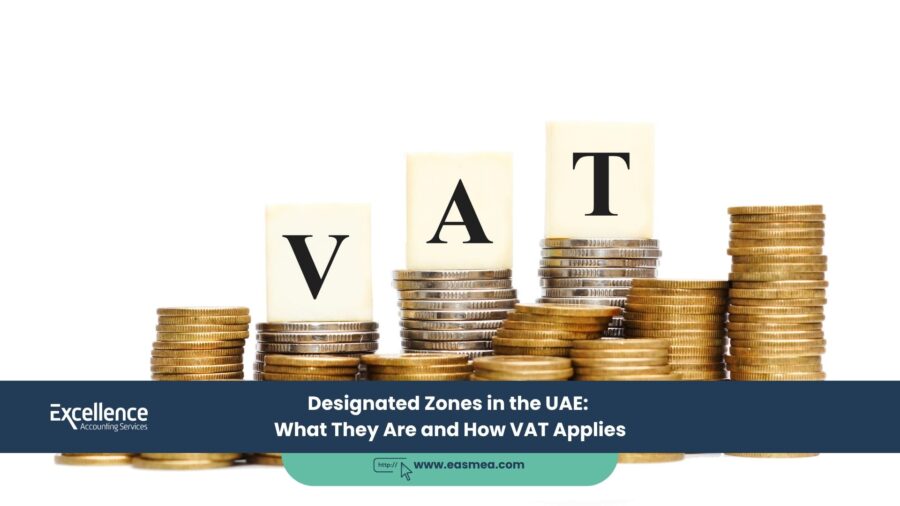Designated Zones in the UAE: What They Are and How VAT Applies
The UAE’s Free Zones are world-renowned hubs for trade and investment, offering numerous benefits to businesses. However, with the introduction of VAT, a new layer of complexity emerged. A common and costly mistake businesses make is assuming that all Free Zones are treated the same for tax purposes. This is not the case. The Federal Tax Authority (FTA) has created a special category called a “Designated Zone”, which has a unique set of VAT rules that are critically important for any business involved in trade and logistics.
- Designated Zones in the UAE: What They Are and How VAT Applies
- What Exactly is a Designated Zone?
- The Official List of Designated Zones
- VAT Treatment in Designated Zones: A Transaction-Based Guide
- Expert VAT Guidance for Your Zone-Based Business
- Frequently Asked Questions (FAQs)
- Operating in a Designated Zone?
Understanding the difference between a standard Free Zone and a Designated Zone is fundamental to VAT compliance. While a Free Zone is a geographical area with special economic regulations, a Designated Zone is a specific type of Free Zone that meets strict customs control criteria, effectively treating it as being ‘outside’ the UAE for VAT purposes on goods. Misunderstanding these rules can lead to incorrect VAT treatment, cash flow problems, and significant FTA penalties.
This guide will provide a clear and comprehensive explanation of Designated Zones in the UAE. We will cover what they are, which zones qualify, and most importantly, how VAT is applied to transactions involving goods and services within, between, and across the borders of these special zones.
Key Takeaways
- Not All Free Zones are Designated Zones: This is the most critical point. A Designated Zone is a specific list of Free Zones that meet strict FTA criteria for customs controls.
- Special Rules Apply Only to Goods: The unique VAT treatment in Designated Zones (being ‘outside the scope’) applies only to the supply of goods.
- Services are Always Taxable: Any supply of services, even when provided within a Designated Zone, is subject to standard UAE VAT rules (5% VAT).
- Goods Moved to Mainland are Imports: When goods are moved from a Designated Zone to the UAE mainland, it is treated as an import, and the recipient must account for VAT via the Reverse Charge Mechanism (RCM).
- Record-Keeping is Essential: Businesses operating in Designated Zones must maintain precise records to prove the movement of goods and justify the VAT treatment applied.
What Exactly is a Designated Zone?
A Designated Zone is a fenced geographical area that has specific security and customs control measures in place to monitor the entry and exit of individuals and the movement of goods. To qualify, a Free Zone must have customs procedures that are equivalent to those applied at the border, effectively treating it as an international territory for the purposes of VAT on goods.
The key purpose of this classification is to facilitate the UAE’s position as a global logistics and trans-shipment hub. By treating the movement of goods between Designated Zones as outside the scope of VAT, it allows for frictionless trade and improves cash flow for businesses involved in import, storage, and re-export, as they do not have to pay and reclaim VAT on these movements.
Think of a Designated Zone as a secure, customs-controlled ‘transit lounge’ for goods. As long as the goods stay within this lounge or move to another one, no UAE VAT is applied. The moment they exit the lounge into the UAE mainland, VAT becomes due.
The Official List of Designated Zones
It is crucial to know that a business cannot decide for itself if it is in a Designated Zone. The FTA maintains an official list. If a Free Zone is not on this list, it is treated as part of the UAE mainland for all VAT purposes. As of the latest updates, the key Designated Zones include:
- Dubai: Jebel Ali Free Zone (Jafza), Dubai Cars and Automotive Zone (DUCAMZ), Dubai Textile City, Free Zone Area in Dubai World Central (Dubai South), Dubai Airport Free Zone (DAFZA).
- Abu Dhabi: Abu Dhabi Airport Free Zone, Khalifa Port Free Trade Zone (Khalifa Industrial Zone Abu Dhabi – KIZAD).
- Sharjah: Hamriyah Free Zone, Sharjah Airport International Free Zone (SAIF Zone).
- Ras Al Khaimah: RAK Free Trade Zone, RAK Maritime City Free Zone.
- And others across Ajman, Umm Al Quwain, and Fujairah. Always refer to the official FTA list for the most current information.
VAT Treatment in Designated Zones: A Transaction-Based Guide
The VAT treatment depends entirely on the nature of the transaction. The rules for goods are very different from the rules for services.
The Golden Rule for Services
This is the simplest and most important rule to remember: **The special Designated Zone rules DO NOT apply to services.**
Any service provided is subject to the standard UAE VAT rules.
- A service supplied from the mainland to a DZ is subject to 5% VAT.
- A service supplied from a DZ to the mainland is subject to 5% VAT.
- A service supplied between two companies in the same DZ is subject to 5% VAT.
VAT Treatment for Goods
This is where the specific rules apply, offering significant cash flow advantages.
| Transaction Type (Goods Only) | VAT Treatment | Explanation |
|---|---|---|
| Within a Single Designated Zone | Outside the Scope of VAT | A sale of goods between two companies in Jafza is not subject to VAT. |
| Between Two Designated Zones | Outside the Scope of VAT | Moving goods from a warehouse in DAFZA to one in KIZAD is not a taxable event. |
| Import from Outside UAE into a DZ | Outside the Scope of VAT | Bringing goods from China into a warehouse in Hamriyah Free Zone does not trigger UAE VAT. |
| Export from a DZ to Outside UAE | Outside the Scope of VAT | Shipping goods from your warehouse in Jafza to a customer in Saudi Arabia is not subject to UAE VAT. |
| From UAE Mainland to a DZ | Standard Rated (5% VAT) | A supplier in Al Quoz selling goods to your company in DAFZA must charge 5% VAT. |
| From a DZ to UAE Mainland | Import subject to RCM | When you move goods from your Jafza warehouse to a customer in Dubai, it’s an import. The customer must account for VAT using the Reverse Charge Mechanism. |
Expert VAT Guidance for Your Zone-Based Business
The rules for Designated Zones are complex and require careful management. Misinterpreting the rules can lead to costly errors. Excellence Accounting Services (EAS) provides specialized VAT consultancy for businesses operating in and transacting with Free Zones and Designated Zones.
How We Can Help:
- Compliance Review: We can conduct a VAT health check to ensure you are correctly applying the rules for Designated Zones and are not at risk of penalties.
- VAT Return Filing: Our team will accurately prepare and file your VAT returns, correctly reporting all transactions involving Designated Zones, including the application of RCM.
- Strategic Advice: We can advise you on the most tax-efficient way to structure your supply chain and logistics operations involving Designated Zones.
Frequently Asked Questions (FAQs)
If your Free Zone is not on the official list, it is treated exactly like the UAE mainland for all VAT purposes. All your sales to customers within the UAE (including those in your own Free Zone) are subject to 5% VAT, and you follow the standard rules.
It depends on your turnover. Even though your sales (exports) are outside the scope of VAT, you may still be required to register if your taxable expenses in the UAE exceed the voluntary registration threshold (AED 187,500). Registering would be beneficial as it would allow you to recover the VAT on your local costs, like rent and utilities.
You must maintain robust documentation to prove the movement of goods. This includes transportation documents, customs declarations (if any), and detailed inventory records showing the goods leaving one DZ and arriving at the other. Without this proof, the FTA could deem the transaction taxable.
Yes. The special rules do not apply to services. This is a standard supply of services within the UAE, and you must charge 5% VAT.
This is an import. You, as the recipient on the mainland, are responsible for accounting for the 5% VAT on your VAT return using the Reverse Charge Mechanism (RCM). You declare the VAT as both output tax and input tax.
If the goods are consumed, used, or altered in any way during the transfer process that is not essential for the transfer itself, the “outside the scope” treatment is lost. The supply would then become subject to 5% VAT.
Yes, but it requires careful configuration. You need to set up specific tax treatments for Designated Zone transactions to ensure they are excluded from the VAT calculation on your sales but correctly reported where necessary. It is highly recommended to have this setup done by a professional accountant or consultant.
The main benefit is cash flow. For businesses involved in high-volume import and re-export, not having to pay 5% VAT upfront on imported goods and then wait to reclaim it on exported goods frees up a significant amount of working capital.
No. If the goods are supplied within the DZ or to another DZ, their invoice should not show any VAT. If they are supplying the goods to you on the mainland, they will issue an invoice without VAT, and you will be responsible for the RCM accounting.
The definitive source is the Federal Tax Authority (FTA) website. The list can be updated by a Cabinet Decision, so it’s important to always refer to the official source for the most current information.
Conclusion: Precision is Paramount
The Designated Zone regime is a powerful tool for facilitating trade in the UAE, but it demands precision from businesses. A clear understanding of the distinction between goods and services, and between Designated Zones and the mainland, is essential for compliance. By applying the rules correctly and maintaining meticulous records, you can leverage the benefits of Designated Zones while avoiding the significant penalties that come with getting it wrong.
Operating in a Designated Zone?
Our expert VAT consultants specialize in the nuances of Free Zone and Designated Zone regulations.




